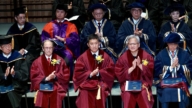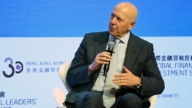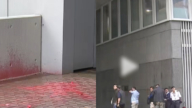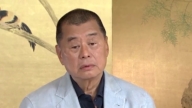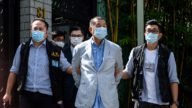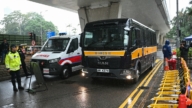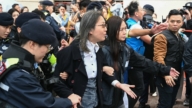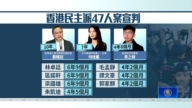【新唐人2015年01月12日讯】日前,华人首富李嘉诚宣布将他商业帝国中的两家旗舰企业合并重组,新公司的注册地也不再是香港,而是选择了号称避税天堂的开曼群岛。消息出来后,外界普遍认为,历来嗅觉灵敏的李嘉诚,这一举动和最近的中共政治气氛有关。
1月9号亚洲首富李嘉诚发表企业重大重组计划,两大上市公司——长江实业与和记黄埔重新组合,变成两个新公司:长和、长地。
长和将接管长江实业与和记黄埔的非地产业务,而地产业务将由长地负责。重组预计将在2015年上半年结束前后完成。
值得留意的是,新成立的长地和长和,都是英国海外属土开曼群岛注册的公司﹔而原来的长江实业及和记黄埔则是香港注册公司。
《法国广播电台》对此评论,这样一来,使得李嘉诚这次表面上是商业决定的重组计划,蒙上浓厚的政治色彩。
报导称,李嘉诚是江泽民时代的“红顶商人”,两人交情匪浅,江泽民访问香港时,不但下榻李拥有的酒店,还与李嘉诚三父子共进早餐,而李嘉诚在当年大举投资大陆,获利丰厚。
据香港《凤凰网》报导,1989年中国大陆发生六四天安门事件,当时外资企业大举撤资,李嘉诚反而大举进军中国大陆市场,六四事件两年后,李嘉诚夺得香港另外一个商业电台广播牌照。
报导还说,北京的大型综合物业项目“东方广场”,是李嘉诚在中国大陆的“得意杰作”。1993年规划的东方广场,坐落在王府井的绝佳位置,占地10万平方米,当时半年内,迁走了长安街上20余个国家部级单位、40余个市级单位、100余个区级单位、1800余户居民。
美国南卡罗莱纳大学艾肯商学院终身教授谢田:“对中共来说,面临国际制裁,国际上非常孤立的时候,有这么个人进来投资,来支持他们,中共肯定也是感恩戴德,投桃报李,让他赚了很多很多钱。”
英国《路透社》报导,江泽民孙子江志成的博裕资本,首期私募基金集资10亿美元,其中包括李嘉诚基金会。
《法国广播电台》的报导称,到了胡温年代,李嘉诚在大陆的事业已转趋低调。而到了习近平当政,李嘉诚在大陆的地位,似乎已是明日黄花。
去年7月大陆《华夏时报》报导,多个地方政府纵容李嘉诚囤地谋取暴利。长和系在全国近十个城市十余个项目,延长土地开发周期从6年到10多年不等。开发项目4年才完成1%。其中,和记黄埔在北京十三陵附近打造的“皇家别墅”北新嘉园,比合同约定的“2004年11月”开工,已经过去近10年,还是没有动静。
在习近平担任中共第五代领导人不到半年时间,2013年7月底,李嘉诚开始抛售大陆企业和地产,涉及金额约为410亿港元。
谢田:“他当年可能是因为江派的关系得到了一些优惠和特权,现在江派开始被清算,从政治上非常敏感的李嘉诚大概感到他最好的时光已经过去了,开始逐渐的把他的资本撤回香港,甚至撤离香港。现在变成海外资本的话,习近平也好,王岐山也好,可能是鞭长莫及。”
去年3月在记者会上,还坚持不会撤资香港的李嘉诚,不足一年,宣布做出迁册的决定。
《中国事务》总编伍凡:“这是说明他对香港没有信心,不信任,对香港这样的变化他接受不了,港人治港现在改变了,是由中国大陆来的一批富豪在治港,还有北京军人治港了。”
不过,李嘉诚在记者会上说公司注册到开曼群岛,是为了做生意平衡风险,不是撤资香港。有学者担忧李嘉诚此举,可能引发撤资潮。
采访编辑/刘惠 后制/萧宇
Li Ka-shing’s New Companies Announce Incorporation in Cayman Islands After Restructure
Recently, the wealthiest Chinese man, Li Ka-shing,
announced that his two largest listed companies
would be restructured into two new ones.
The new companies are incorporated in Cayman Islands,
a tax haven in the Caribbean Sea, instead of Hong Kong.
Li’s move was believed to be related to recent political
turmoil within the Chinese Communist Party (CCP).
Li is well known for his great nose for trends.
On Jan. 9, Asia’s richest man Li Ka-shing announced
the restructure plan for his business empire.
His two largest listed companies, Cheung Kong
(CK Holdings) and Hutchison Whampoa, will be
restructured into two new companies,
CK Hutchison Holdings and CK Property Holdings.
CK Hutchison Holdings will manage all CK Holdings
and Hutchison Whampoa businesses other than real estate.
Property businesses will be moved to CK Property Holdings.
The restructure is scheduled to be complete
in the first half of 2015.
It is worth mentioning that both new companies are
incorporated in Cayman Islands, a British overseas territory.
By contrast, both CK Holdings and Hutchison Whampoa
are Hong Kong companies.
Radio France Internationale (RFI) thus commented that
Li Ka-shing’s “business restructure" appears to be
a decision influenced by political factors.
The RFI’s report said Li Ka-shing had been a red-hat
(government-related) entrepreneur during Jiang Zemin’s
era, and had a personal relationship with Jiang.
When Jiang visited Hong Kong, he stayed at Li’s hotel
and had breakfast with Li and his sons.
During those years, Li Ka-shing’s companies heavily
profited from investment in mainland China.
A Phoenix Television website (ifeng.com) report said
that after the June Fourth Incident in 1989,
foreign enterprises had massively retreated from China.
However, Li Ka-shing did the opposite in breaking into China’s market.
Only two years after the June Fourth Incident, Li won a new
broadcasting license issued by Hong Kong government.
The report also said that the Orient Plaza, one of Beijing’s
largest commercial complexes, is Li’s “proud masterpiece."
The plaza, projected in 1993, is located at an excellent place
in Wangfujing, with a total area of 100,000 square meters.
For the plaza to be constructed, about 20 state-level offices,
40 municipal offices, 100 district offices and 1800 residences
were moved in half a year.
Prof. Xie Tian, Aiken Business School, Univ. of S. Carolina:
“The CCP was isolated and facing international sanctions
at that time.
But Li made huge investments to support the CCP.
So it is not surprising that the CCP rewarded Li’s companies
with large profits."
A Reuters report published in April 2014 said Jiang Zemin’s
grandson Jiang Zhicheng had collected 1 billion dollars
as initial funds for his company Boyu Capital.
Li Ka-shing Foundation was one of the investors.
On the other hand, RFI said Li began to play down
his businesses during Hu Jintao and Wen Jiabao’s era.
After Xi Jinping took power, Li Ka-shing and his companies
had almost become a thing of the past.
Last July, a China Times report pointed out the local CCP
governments’ indulged Li’s companies,
which made huge profits via land hoarding.
The report said CK Holdings had many development
projects in dozens of Chinese cities.
These projects had extended development periods
of six to 10 years.
Some projects only made one-percent progress
in four years.
For example, Hutchison Whampoa had a “royal villa" project
called “Beixin Jiayuan" around the Ming Tombs in Beijing.
The project had been scheduled to start in November 2004,
but nothing happened as 10 years had passed.
In July 2013, only half a year after Xi Jinping became
the CCP’s fifth-generation leader, Li Ka-shing began to sell
his businesses and properties in China
worth about $5.29 billion (41 billion HKD) in total.
Xie Tian: " A possible scenario is that Li Ka-shing used
to have privileges in China as he had personal relationships
with Jiang Zemin.
Now Jiang’s faction is about to collapse.
Li thus sensed with his great nose that his best days
in China had passed.
As a result, his businesses began to retreat to Hong Kong,
or even other countries.
Once his money turned into overseas capital, Xi Jinping
and Wang Qishan would not be able to do anything.
In a press conference in March 2013, Li Ka-shing
said his companies would not leave Hong Kong.
In less than one year, Li broke his promise and announced
the restructure plan.
Wu Fan, editor-in-chief of China Affairs magazine:
“The move suggests that Li has no confidence
in Hong Kong’s future.
He cannot accept the changes that magnates
and armies from mainland China are ruling Hong Kong
instead of Hong Kong people."
On the other hand, Li Ka-shing still claims
his new companies were moved to Cayman Islands
only for risk control, and is not withdrawal of investment
from Hong Kong.
Scholars believe many business people may follow
Li Ka-shing, resulting in mass divestment in Hong Kong.
Interview & Edit/LiuHui Post-Production/XiaoYu



